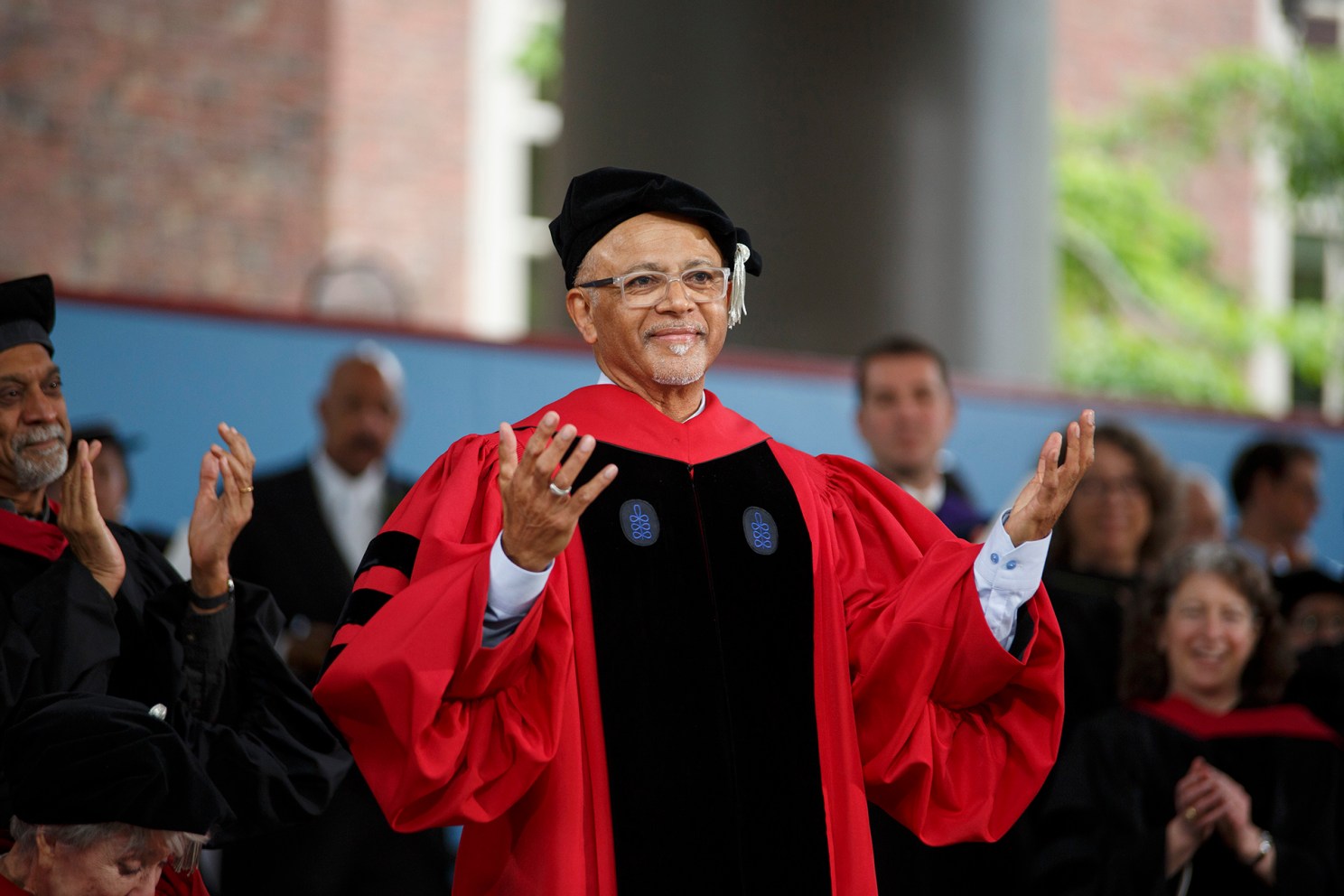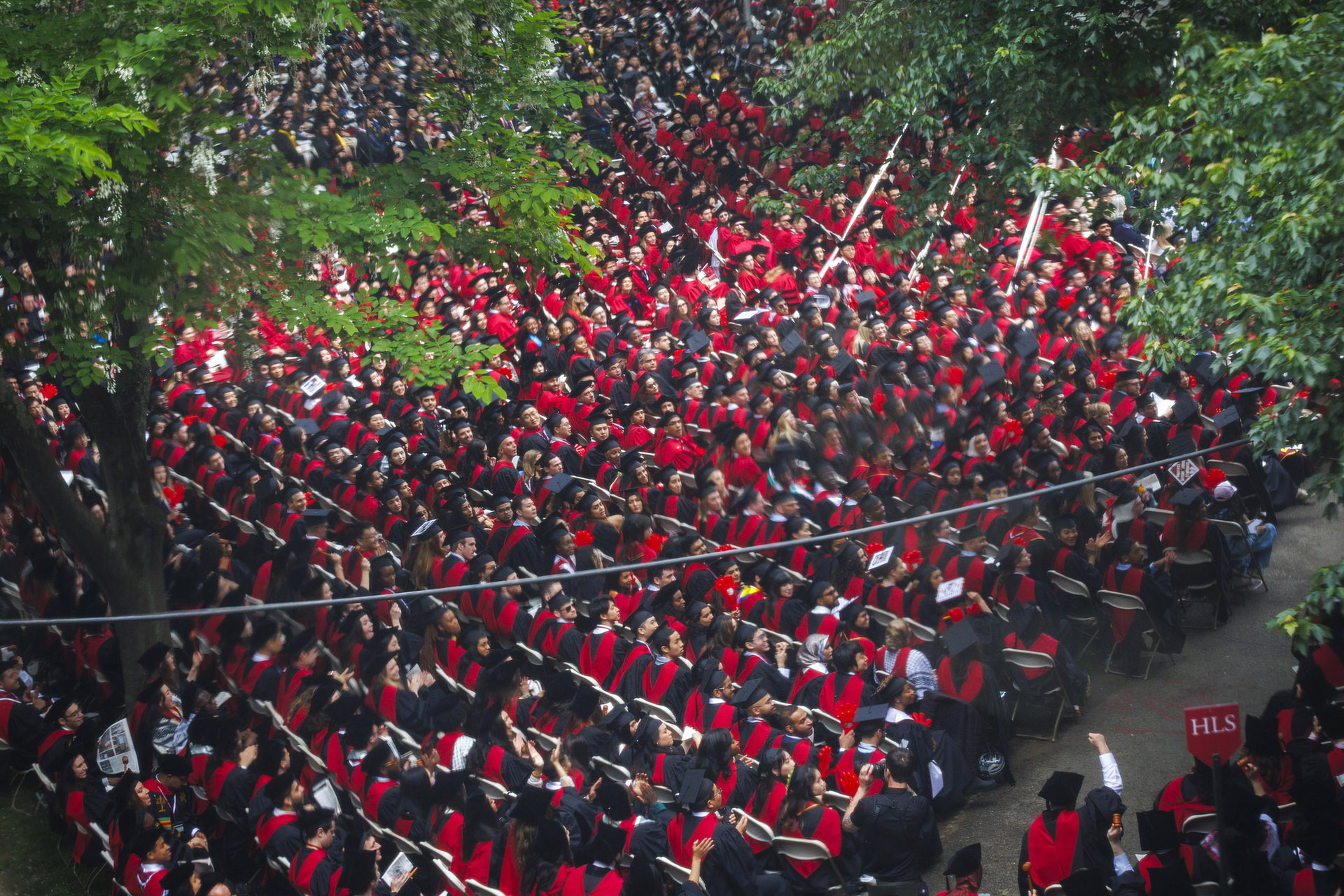Verghese tells an American story

Photo by Grace DuVal
Physician-writer foregrounds immigrants’ contributions to Harvard and the nation, urges graduates to show courage, character in face of hardship
Part of the Commencement 2025 series
A collection of features and profiles covering Harvard University’s 374th Commencement.
Abraham Verghese underscored the vital role of immigrants in the life of the nation at Harvard’s 374th Commencement Thursday at Tercentenary Theatre. He was speaking from experience.
Born in Ethiopia to expatriate teachers from India, Verghese, a doctor and writer, began his medical studies in Addis Ababa but had to interrupt them as the country descended into civil war in 1974. After completing his medical studies at Madras Medical College in India, he arrived in Johnson City, Tennessee, as an infectious disease specialist in the mid-1980s, the early days of the AIDS epidemic.
Verghese, who teaches at Stanford, was the principal speaker at Commencement, which unfolded as a federal judge in Boston extended a temporary restraining order blocking the Trump administration’s revocation of Harvard’s ability to host international students and scholars. That action and others by the government were on Verghese’s mind as he delivered a passionate defense of immigrants and international students living, studying, and working in the U.S.
“When legal immigrants and others who are lawfully in this country, including so many of your international students, worry about being wrongly detained and even deported, perhaps it’s fitting that you hear from an immigrant like me,” he said.
He also spoke directly to the contributions of foreign-born doctors at hospitals across the country.
“We were recruited here because American medical schools simply don’t graduate sufficient numbers of physicians to fill the country’s need,” said Verghese, who spent two years early in his career at what is now Boston Medical Center. “More than a quarter of the physicians in the country are foreign medical graduates, many of them ultimately settling in places that others might not find as desirable.
“A part of what makes America great, if I may use the phrase, is that it allows an immigrant like me to blossom here, just as generations of other immigrants and their children have flourished and contributed in every walk of life, working to keep America great.”

Pointing to his experience as a graduate of the Iowa Writers’ Workshop — his books include “Cutting for Stone,” “My Own Country,” and “The Covenant of Water” — Verghese credited America for enriching his life as an author. He quoted the novelist E.L. Doctorow: “It is the immigrant hordes who keep this country alive, the waves of them arriving year after year. Who believes in America more than the people who run down the gangplank and kiss the ground?”
He also praised Harvard President Alan Garber for resisting Trump administration demands for viewpoint audits and other measures, even as dramatic funding cuts imperil the University’s ability to carry out its research mission. Harvard deserves support and praise, he said, for “affirming and courageously defending the essential values of this university, and indeed of this nation.”
Closing his remarks, Verghese offered a few pieces of advice to the Class of 2025. First, he urged students to read fiction, because novels offer “powerful lessons about life” and can open a reader’s mind to unfamiliar lives and experiences. He was inspired to become a doctor in part by reading W. Somerset Maugham’s “Of Human Bondage,” he recalled.
“If you don’t read fiction,” Verghese said, “my considered medical opinion is that a part of your brain responsible for active imagination atrophies.”
Verghese also stressed the importance of character and courage: “Graduates, the decisions you will make in the future under pressure will say something about your character, while they also shape and transform you in unexpected ways. Make your decisions worthy of those who supported, nurtured, and sacrificed for you: your parents, your partners, your family, and your ancestors. Make your decisions worthy of this great university and the hardship it must endure going forward as it works to preserve the value of what you accomplished here.”
Lastly, drawing on the lessons he learned from AIDS patients he tended to Tennessee in the mid-1980s, Verghese asked students to take great care with the gift of time. Seeing men in their 30s and 40s face death was heartbreaking, he said, but he found comfort in the fact that many of them, at the end of their lives, cherished the company of family.
“They found that meaning at the end of a shortened life did not reside in fame, power, reputation, money, or good looks,” he said. “Instead, they found that meaning in their lives ultimately resided in the successful relationships they had forged in a lifetime, particularly with family.”
Verghese read to the crowd a letter he had shared many times before. In it, a young man dying of AIDS assures his mother that, having fulfilled many of his dreams, he has no regrets, and is grateful that his illness has allowed him to slow down to spend time with his family.
“I’ve enjoyed a life full of adventure and travel, and I loved every moment of it. But I probably never would have slowed down enough to really appreciate all of you if it hadn’t been for my illness. That’s the silver lining in this very dark cloud …
“If anyone ever asks you if I went to heaven, tell them this: I just came from there. No place could conceivably be as wonderful as where I’ve spent these last 30 years. I’ll miss it. I’ll miss you, mother. I’m so glad we made good use of this time to get to know each other again.”
After reading the last lines, Verghese exhorted students, “Cherish this special day. And above all, make good use of your time.”




